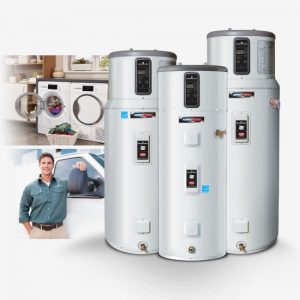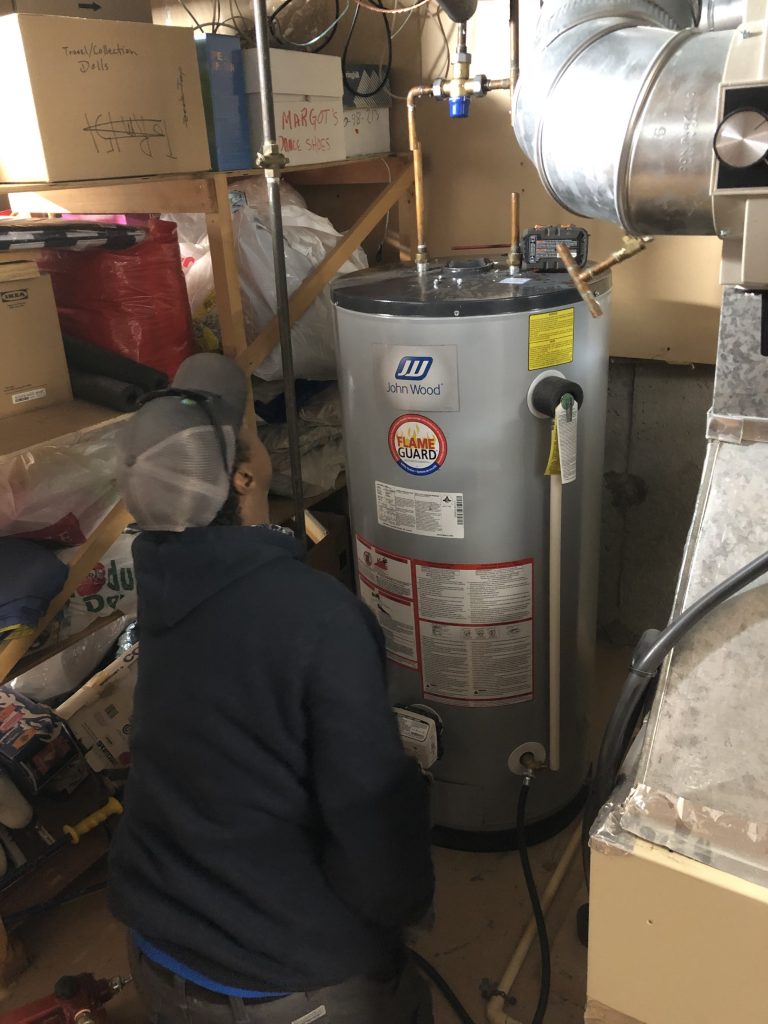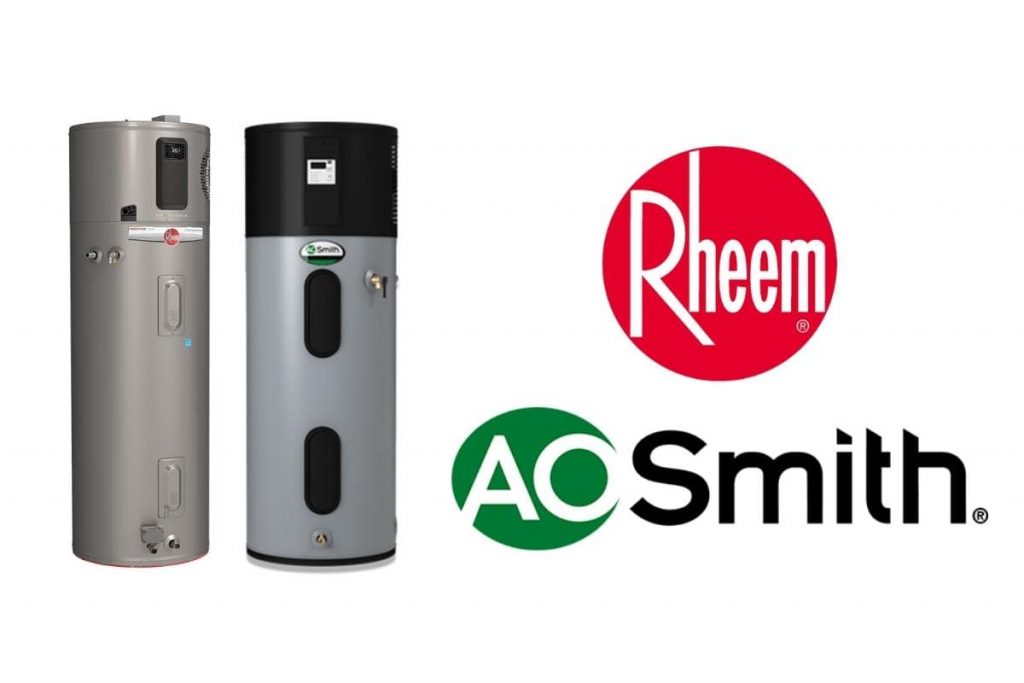Looking to install a heat pump water heater in Ottawa? As the demand for sustainable living practices continues to grow, the choice of appliances becomes crucial in shaping a greener, more eco-friendly lifestyle.
With traditional water heaters gradually becoming outdated and environmentally unsustainable, it’s important for homeowners to explore alternative options that align with both energy efficiency goals and cost-effectiveness.
This guide should empower you with the knowledge needed to make an informed decision on the pros and cons of installing a heat pump water heater in your Ottawa home. We answer your pressing questions including:
- Best 2024 Heat Pump Water Heaters
- What Is A Heat Pump Water Heater?
- What Are The Benefits of Heat Pump Water Heaters?
- How Much Do Heat Pump Water Heaters Cost?
- How Is a Heat Pump Water Heater Installed?
- What Are The Best Heat Pump Water Heater Brands?
Best 2024 Heat Pump Water Heaters
Rheem Professional Prestige Series ProTerra
Rheem is a well-established brand known for producing high-quality heat pump water heaters. The ProTerra Hybrid Electric Water Heater is a standout model that combines the benefits of heat pump technology with traditional electric heating elements. Key features include:
- Save energy through the use of heat pump technology – uses up to 75% less energy than a standard electric water heater.
- Advanced electronic controls for precise temperature management – save money on operating costs by using less heating energy.
- Eco-friendly operation with reduced carbon emissions.
- Available in multiple sizes to suit varying household needs. A smart replacement option for a standard electric water heater with zero clearance requirement – Proterra Hybrid fits in small spaces, even closets.
Bradford White AeroTherm® Series
Bradford White’s AeroTherm® Series heat pump water heaters are a great, efficient way for heating water in your home. As an ENERGY STAR® certified heat pump water heater, you’ll save hundreds of dollars a year compared to standard electric water heaters.
- Zero emissions and reduced energy consumption make this heat pump water heater very eco-friendly
- Easily control the appliance through the proprietary app
- Choose from 5 operating modes for optimal performance and efficiency:
- Heat pump only mode
- Hybrid standard mode
- Hybrid plus mode
- Electric only mode
- Vacation mode
- Available in 80 gallon, 65 gallon, and 50 gallon models
AO Smith ProLine® XE Voltex®
AO Smith is another reputable brand recognized for its commitment to innovation and efficiency. The ProLine XE® Voltex® Hybrid Electric Heat Pump Water Heater is a top-tier model with features such as:
- Energy Star certification for high energy efficiency.
- CFC-free refrigerant for environmentally responsible operation.
- Multiple operating modes for flexibility in different scenarios.
- Quality construction for durability and reliability.
GSW Heat Pump Water Heater
The GSW Hybrid Electric Heat Pump water heater is a reliable, cost-effective way to save money on your electric utility bills. The water heaters are available in 50, 66, and 80 gallon capacities, and come with a variety of features, including:
- Up to a 3.45 Energy Factor (EF) rating to conserve energy – this exceeds ENERGY STAR® qualifications
- 3 different modes – Efficiency, Hybrid, or Electric – to match your home’s heating requirements according to environmental conditions
- Vacation mode that reduces operating costs and provides freeze protection during an extended absence
- Superior tank protection with replaceable stainless steel anode rods
- User-friendly electronic display screen that allows you to easily control temperature and operating mode, as well as view diagnostics
What is a Heat Pump Water Heater?
Understanding the Technology
At its core, a heat pump water heater (also called a hybrid water heater) operates on the principle of extracting heat from the surrounding air to warm the water. The process begins with the heat pump unit drawing in air from the surroundings. This air contains latent thermal energy even in colder temperatures. The heat pump extracts this energy and uses it to heat a refrigerant, transforming it from a liquid to a gas.
The heated gas is then compressed, releasing the captured heat, which is transferred to the water in the storage tank. The result is a continuous supply of hot water for your household.
Differences from Traditional Water Heaters
The primary distinction between heat pump water heaters and traditional models lies in their energy source. Traditional storage tank water heaters, and even tankless water heaters, rely on electricity or gas to generate heat water directly, while heat pumps tap into the existing heat in the air.
This fundamental shift in approach results in substantial energy savings and a reduced environmental impact.
Benefits of Heat Pump Water Heaters

Energy Efficiency
Heat pumps are renowned for their unparalleled energy efficiency. Unlike conventional water heaters that generate energy to directly heat water, heat pump models leverage existing warmth in the air. This method consumes significantly less energy, resulting in lower utility bills. The efficiency gains are particularly noticeable in moderate climates, making them ideal for Ontario’s varied weather patterns.
Cost Savings
The increased energy efficiency translates into substantial cost savings over time. While the initial investment may be slightly higher than traditional water heaters, the reduced energy consumption ensures that homeowners recoup their costs through lower utility bills.
Longevity
Investing in a heat pump is an investment in long-term reliability. This system tends to have a longer lifespan compared to a conventional water heater, reducing the frequency of replacements. This longevity not only minimizes maintenance costs but also contributes to a more sustainable approach by reducing the overall environmental impact associated with manufacturing and disposing of appliances.
Environmentally Friendly
The reduced energy consumption of heat pump water heaters translates into a smaller carbon footprint. By relying on ambient heat in the air rather than burning fossil fuels or directly using electrical resistance like conventional electric water heaters do, these systems contribute to lower greenhouse gas emissions.
Rebates and Incentives
Governments and utility companies recognize the importance of transitioning to energy-efficient appliances. In Ontario, initiatives like the Greener Homes Grant offer financial incentives for homeowners adopting environmentally friendly technologies. Installing a heat pump water heater can make you eligible for such rebates, making the initial investment even more attractive.
How Much Do Heat Pump Water Heaters Cost?
Understanding the cost considerations associated with heat pump water heaters is essential for making an informed decision about this energy-efficient technology. In this section, we’ll explore both the upfront costs and the long-term savings, providing a comprehensive view of the financial aspects involved.
Upfront Costs
The initial investment for a heat pump water heater is typically higher than that of traditional water heaters. This is due to the advanced technology and components involved in extracting and transferring heat from the air. However, it’s crucial to view this expense as a long-term investment with substantial returns in terms of energy efficiency and savings.
When considering upfront costs, it’s essential to factor in potential rebates and incentives. In Ontario, programs like the Greener Homes Grant can significantly offset the initial expense, making the transition to a heat pump water heater more financially viable. Be sure to explore available incentives that can make the upfront investment more manageable.
Long-Term Savings
While the initial costs may be higher, the long-term savings associated with heat pump water heaters are a key factor in their appeal. Thanks to their energy-efficient operation, homeowners can experience a substantial reduction in monthly utility bills. The energy savings accumulate over time, eventually offsetting the initial investment and resulting in significant financial benefits.
Consider the average lifespan of a heat pump water heater, which tends to be longer than traditional models. The reduced need for replacements, coupled with ongoing energy savings, contributes to a more economically sound and sustainable solution for your hot water needs.
Return on Investment (ROI)
Calculating the return on investment is a valuable exercise when considering a heat pump water heater. Compare the estimated energy savings over the lifespan of the unit with the initial cost and any applicable rebates. This holistic approach provides a clearer picture of the financial benefits and helps you make a decision that aligns with your budget and long-term goals.
How Is a Heat Pump Water Heater Installed?
Installation Process
Installing hybrid heat pump water heaters involves several critical steps to guarantee its proper functioning.
- S
 ite Assessment: A professional installer will conduct a thorough assessment of your property to determine the most suitable location for the water heater unit. Factors such as ambient air temperature, available space, and proximity to electrical connections are considered.
ite Assessment: A professional installer will conduct a thorough assessment of your property to determine the most suitable location for the water heater unit. Factors such as ambient air temperature, available space, and proximity to electrical connections are considered. - Positioning the Unit: The heat pump unit is typically installed outdoors, where it can draw in ambient air for the heating process. The unit should be positioned to ensure unobstructed airflow and easy access for maintenance.
- Connection to Plumbing System: The heat pump is connected to your existing plumbing system, allowing for the transfer of heated water to your taps and fixtures. This integration ensures a seamless transition from your old water heater to the new, energy-efficient system.
- Electrical Connection: Proper electrical connections are crucial for the efficient operation of the heat pump system. A certified electrician will ensure that the unit is correctly wired to your electrical system, meeting safety standards and ensuring optimal performance.
- Testing and Calibration: Once installed, the system undergoes thorough testing and calibration to verify its functionality. This includes checking the heating elements, thermostat settings, and overall system performance.
Maintenance Requirements
Regular maintenance is crucial to ensure the longevity and efficiency of hybrid water heaters. Here are some maintenance requirements and tips:
- Air Filter Cleaning: The heat pump unit contains an air filter that should be checked and cleaned regularly. A clean filter ensures optimal airflow, contributing to efficient heat exchange.
- Condensate Drain Inspection: The condensate drain, responsible for removing excess moisture from the system, should be inspected for clogs or blockages. Regular clearing of the drain prevents potential issues.
- Inspecting Refrigerant Levels: A professional should periodically inspect and adjust the refrigerant levels in the system. Proper refrigerant levels are crucial for efficient heat transfer.
- Temperature and Pressure Valve Check: The temperature and pressure relief valve should be tested to ensure it functions correctly. This valve plays a crucial role in preventing excessive pressure buildup within the system.
- Professional Check-ups: Schedule regular professional check-ups to assess the overall condition of your heat pump. Professionals can identify potential issues before they become major problems, ensuring a reliable and efficient system.
Tips for Longevity
- Regular Inspections: Conduct regular visual inspections of the unit to identify any signs of wear or damage.
- Timely Repairs: Address any issues promptly to prevent them from escalating into major problems.
- Efficient Operation: Set the thermostat to an efficient temperature and avoid unnecessary adjustments. Consistent operation at moderate temperatures contributes to the system’s longevity.
- Water Quality: Ensure the water quality in your area is suitable for the heat pump water heater. If needed, consider water softening solutions to prevent mineral buildup.
Best Heat Pump Water Heater Brands
Rheem
Rheem is a well-established brand known for producing high-quality heat pump water heaters. The ProTerra Hybrid Electric Water Heater is a standout model that combines the benefits of heat pump technology with traditional electric heating elements. Key features include:
- Energy efficiency through the use of heat pump technology.
- Advanced electronic controls for precise temperature management.
- Eco-friendly operation with reduced carbon emissions.
- Available in multiple sizes to suit varying household needs.
AO Smith
AO Smith is another reputable brand recognized for its commitment to innovation and efficiency. The ProLine XE® Voltex® Hybrid Electric Heat Pump Water Heater is a top-tier model with features such as:
- Energy Star certification for high energy efficiency.
- CFC-free refrigerant for environmentally responsible operation.
- Multiple operating modes for flexibility in different scenarios.
- Quality construction for durability and reliability.
Make the shift towards a greener and more efficient home today
The benefits of heat pump water heaters extend beyond energy efficiency and cost savings. By selecting the right brand and model, you can enjoy a sustainable, reliable, and technologically advanced solution for your home.
To take the next step and bring the advantages of heat pump water heating to your household, request a quote for installation from Hot Water Ottawa.



